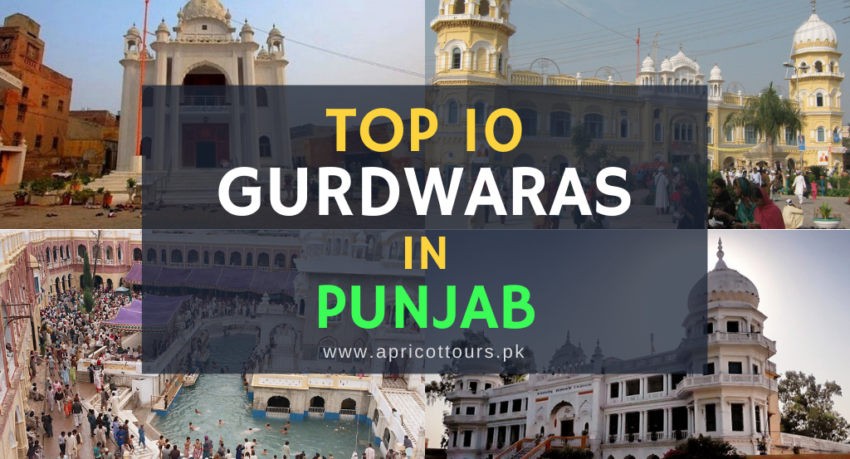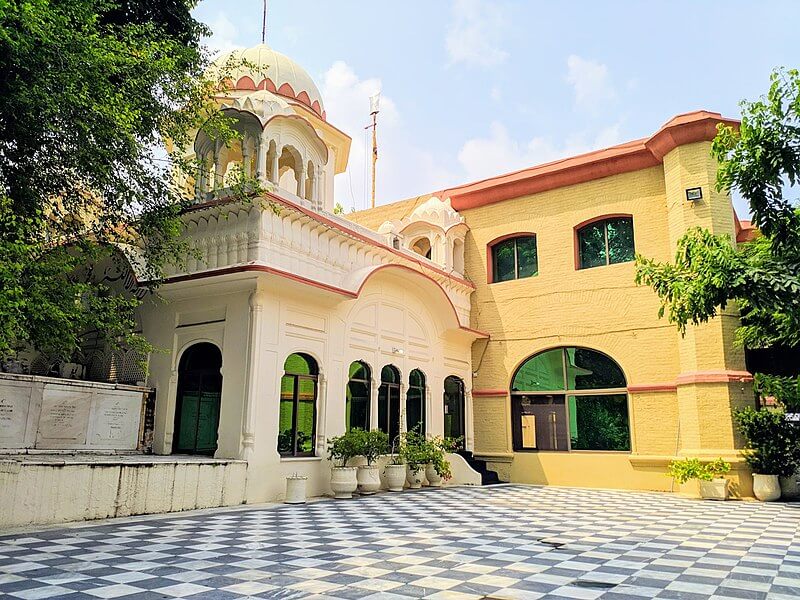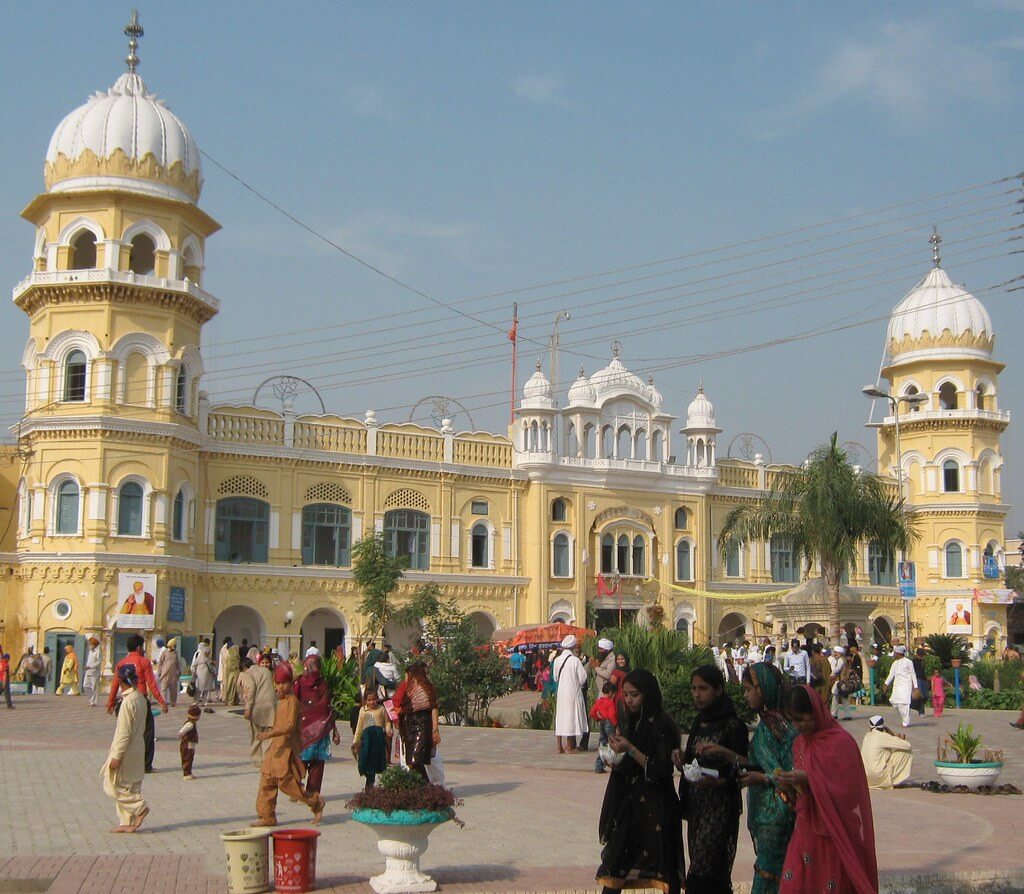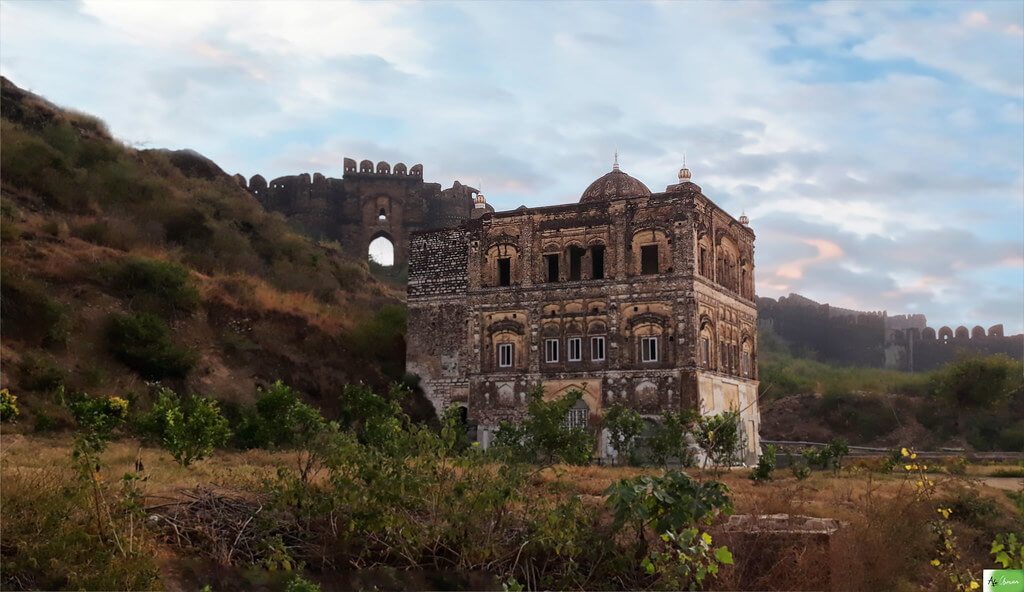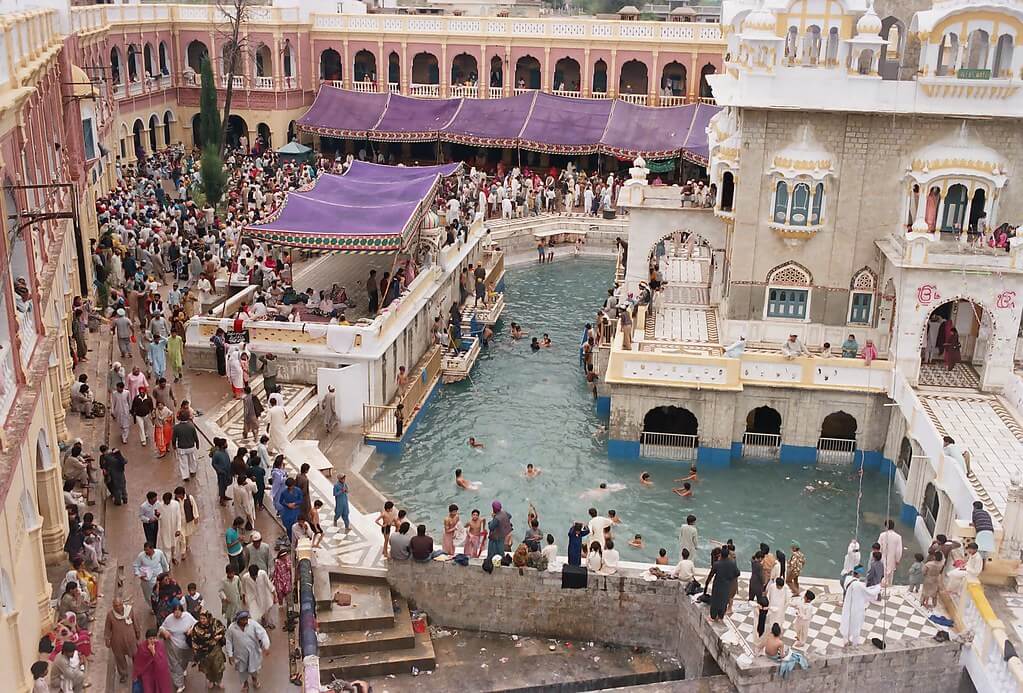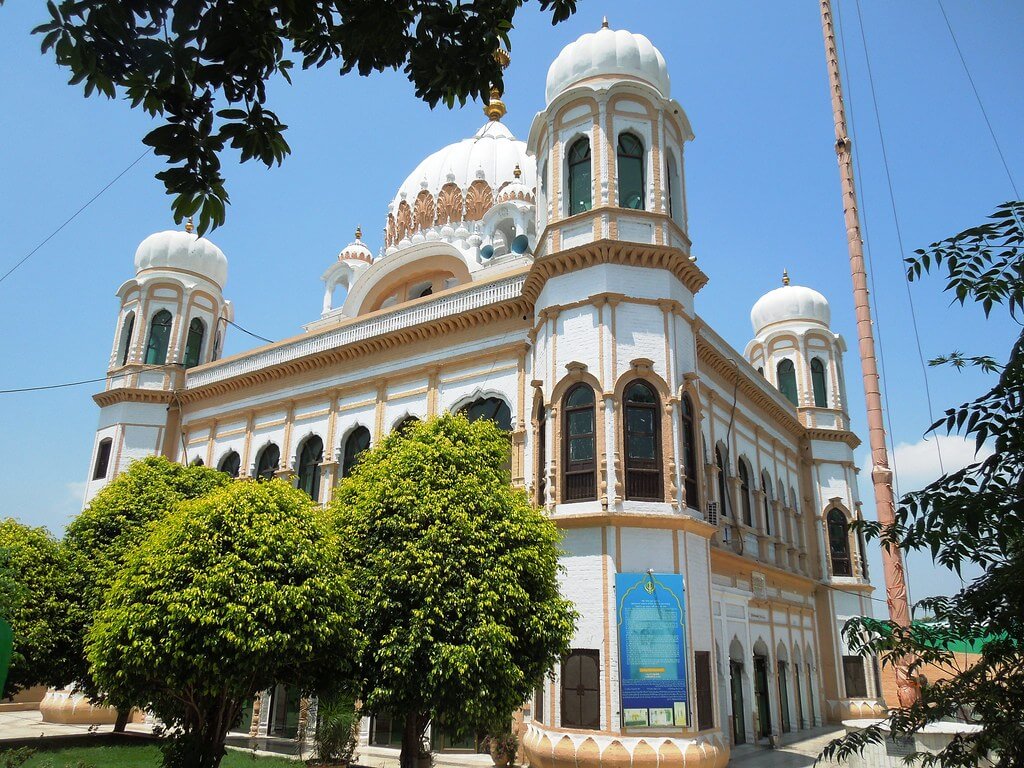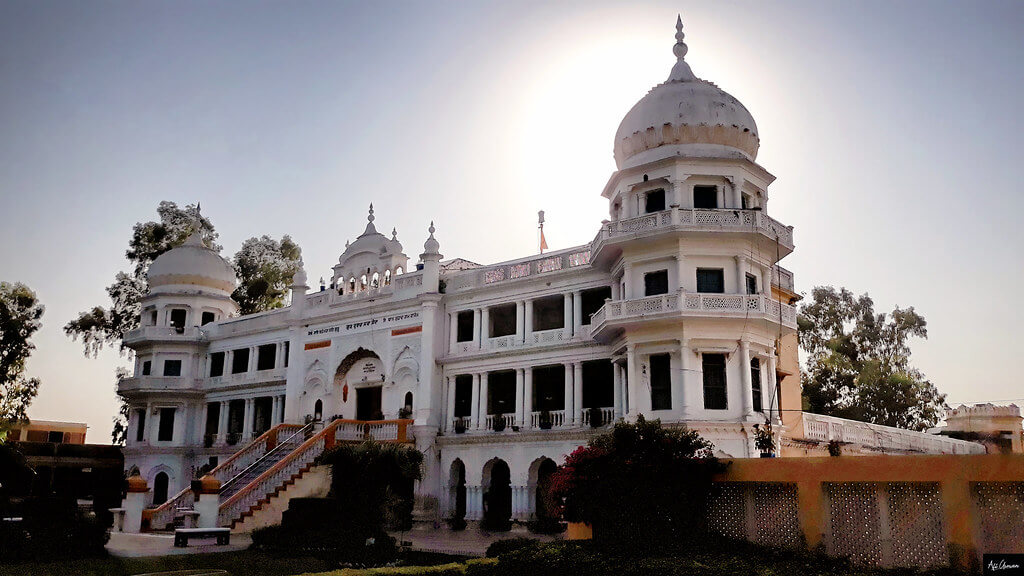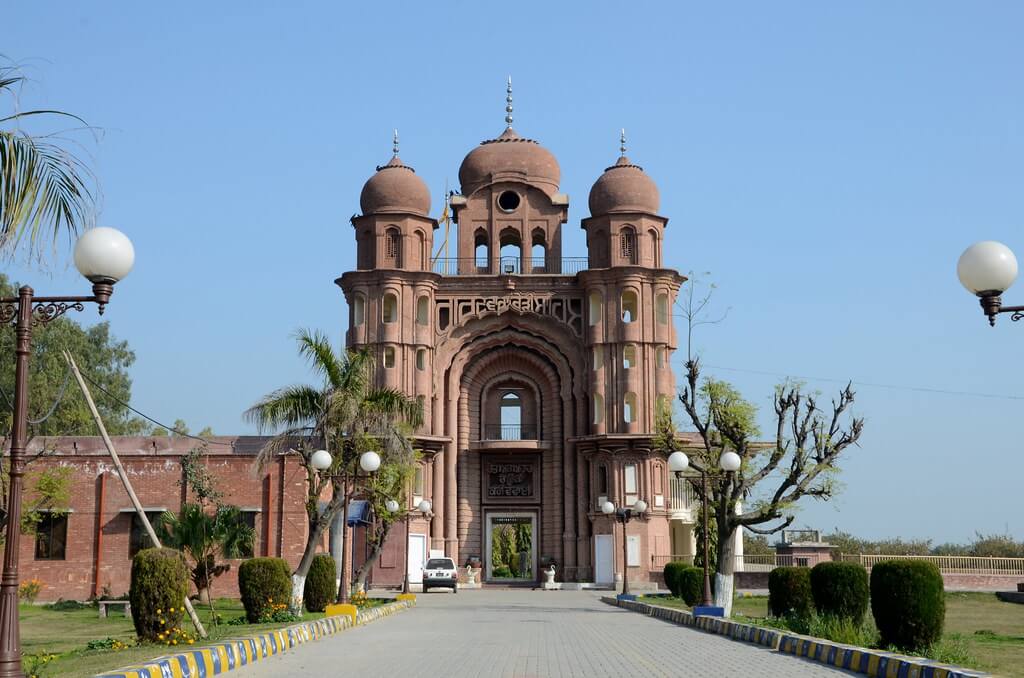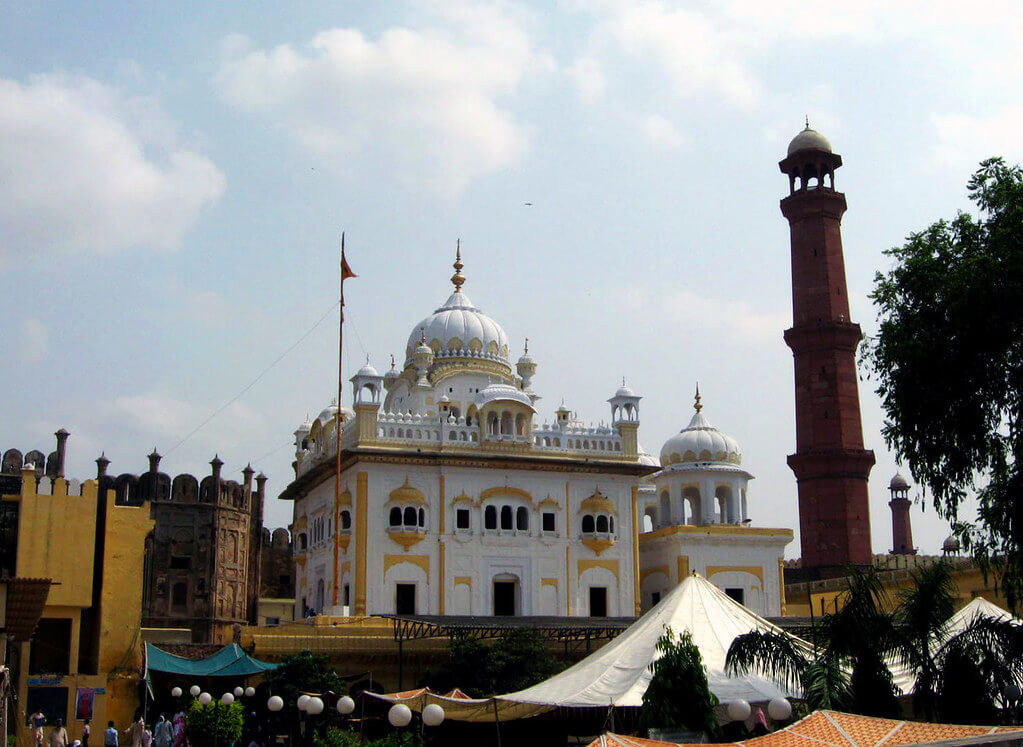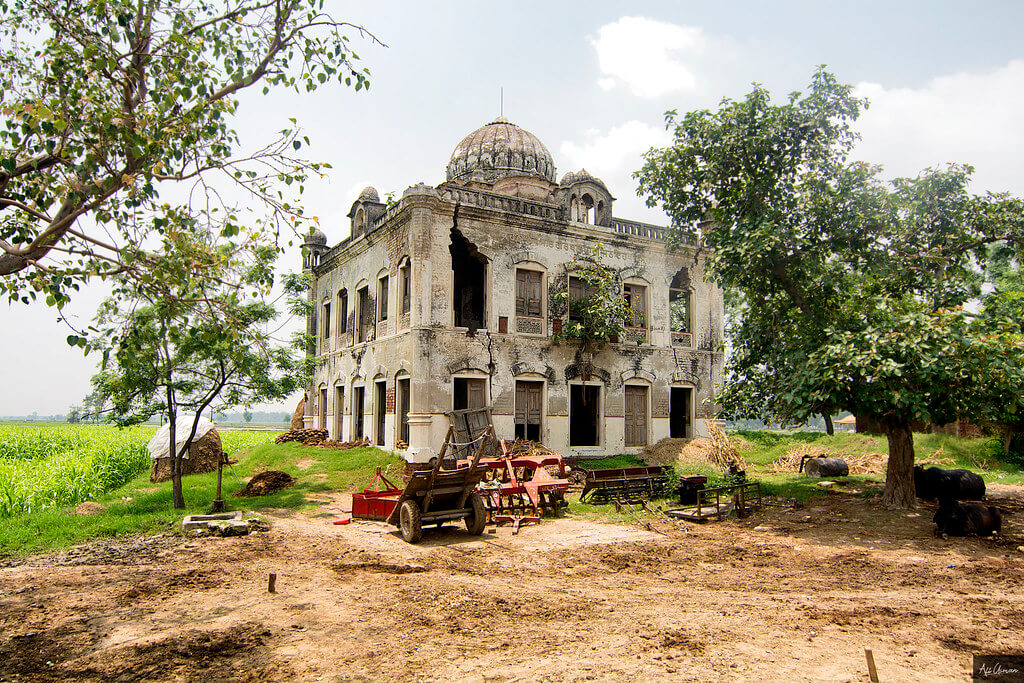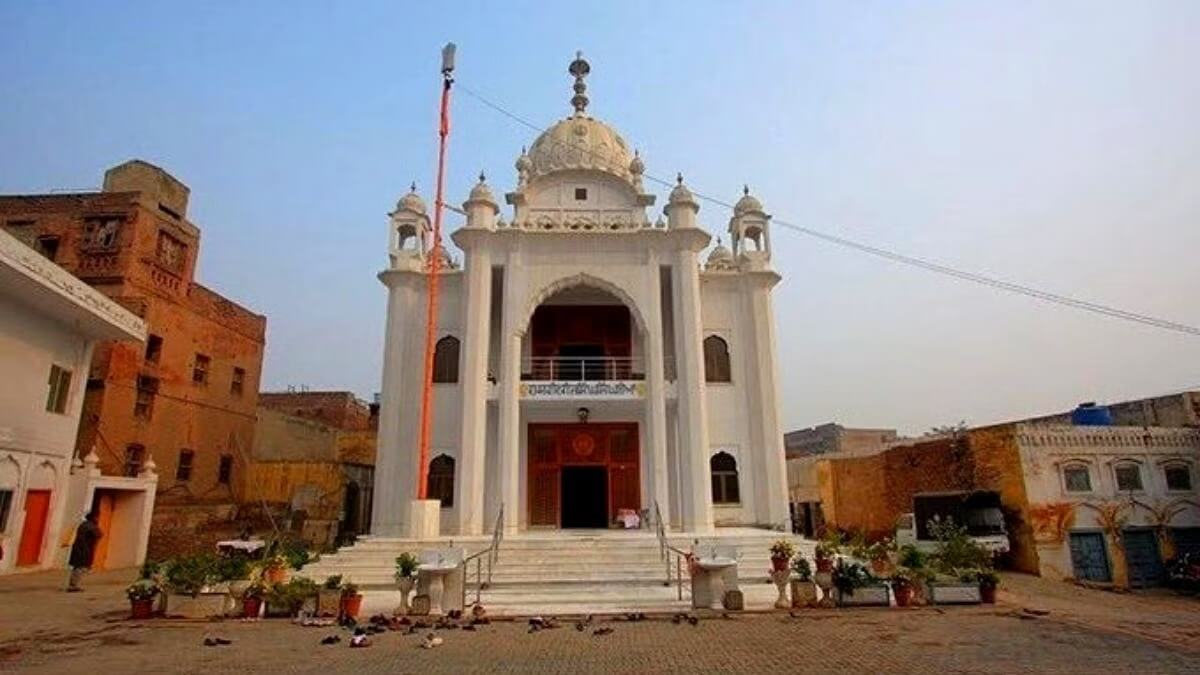Gurdwaras in Punjab, Pakistan is an important religious destination for the Sikh people. Punjab, which means “Land of Five Rivers” in Persian, is home to a sizable Sikh community who see it as sacred territory. The province of Punjab is split between India and Pakistan, with the Indian portion being bigger. However, the Pakistani portion of Punjab also contains numerous significant Gurdwaras.
Sikhs worship in Gurdwaras, which hold the Guru Granth Sahib, Sikhism’s sacred text. Community facilities also provide free meals (langar) to all visitors, regardless of faith or background. Here are some of the most prominent Gurdwaras in Punjab Pakistan:
List of Gurdwaras in Punjab
The gurdwaras in Punjab are mentioned below:
- Gurdwara Beri Sahib
- Gurdwara Janam Asthan, Nankana Sahib
- Gurdwara Chowa Sahib, Jhelum
- Gurdwara Panja Sahib
- Gurdwara Darbar Sahib Kartarpur
- Gurdwara Sacha Sauda Sahib
- Gurdwara Rori Sahib
- Gurdwara Dera Sahib
- Gurdwara Pehli Patshahi
- Gurdwara Shaheed Ganj Bhai Taru Singh Ji
Gurdwara Beri Sahib
Gurdwara Beri Sahib, also known as Gurdwara Bair Sahib or Baba Beri, is a major Sikh temple in Sialkot, Pakistan. This gurdwara is intimately identified with Baba Guru Nanak, the founder of Sikhism, who is supposed to have stayed here and interacted with Sialkot’s notable saint, Hamza Ghaus.
The gurdwara takes its name from the berry tree (beri) where Guru Nanak is said to have rested during his visit to the area. The sacred tree remains on the site, providing a reminder of Guru Nanak’s spiritual presence and teachings.
Natha Singh, a devout Sikh, built Gurdwara Beri Sahib, which features a magnificent landscape, a tranquil pool, and residential accommodations for pilgrims and tourists. The gurdwara provides a tranquil setting in which devotees may connect with their faith and find comfort.
The Gurdwara Beri Sahib received extensive renovations in the 2010s to restore its historical and cultural relevance. The restoration process involved conserving the architecture, landscape, and holiness of the gurdwara. The refurbished gurdwara was subsequently offered to pilgrims and guests, providing them with a revitalized spiritual experience.
Gurdwara Beri Sahib is a valued pilgrimage place for Sikhs from all over the world, and it serves as a tribute to Pakistan’s rich Sikhi legacy. The gurdwara is a place of devotion, introspection, and fellowship for Sikhs, inspiring unity and harmony in all who come.
Gurdwara Janam Asthan, Nankana Sahib
Gurdwara Janam Asthan, also known as Gurdwara Janam Bhoomi, is a sacred Sikh temple located in Nankana Sahib, Punjab, Pakistan. The city’s name is derived from Guru Nanak, the founder of Sikhism, who was born here in 1469. As a result, Gurdwara Janam Asthan is extremely important to Sikhs all over the world, both historically and religiously.
The Gurdwara complex is built on the exact place where Guru Nanak was born, and it includes various buildings and monuments commemorating his life and teachings. The main building, known as the Janam Asthan, is a stunning structure with elaborate architectural elements and ornamentation. The complex also features a langar hall, which serves free meals to tourists, a library containing Sikh scriptures and historical books, and pilgrim lodging.
The inside of the Gurdwara Janam Asthan is decorated with colorful murals, paintings, and sculptures representing scenes from Guru Nanak’s life. The mood within the Gurdwara is one of reverence and devotion, with followers praying and paying homage to the Sikh Guru.
Visitors to Gurdwara Janam Asthan can also visit nearby Sikh historical places like Gurdwara Patti Sahib and Gurdwara Bal Leela. Nankana Sahib is rich in Sikh history and culture, making it a must-see trip for Sikhs and those interested in the faith.
The Gurdwara Janam Asthan at Nankana Sahib represents Guru Nanak’s ongoing legacy and the Sikh religion. It is a beacon of spiritual enlightenment and togetherness for Sikhs from all over the world who flock here to honor their adored Guru and seek his blessings.
Gurdwara Chowa Sahib, Jhelum
Gurdwara Chowa Sahib is a sacred Sikh pilgrimage place in Jhelum, Punjab, Pakistan. This ancient Gurdwara holds significance for Sikhs since it is affiliated with the first Sikh Guru, Guru Nanak Dev Ji. It is claimed that Guru Nanak Dev Ji visited this location during his travels and blessed the area with his presence.
The name “Chowa Sahib” comes from a narrative in which Guru Nanak Dev Ji left behind a water container (chowa). The water in this bottle is claimed to have amazing healing abilities, and followers think that drinking it may cure many illnesses and bring good fortune.
The Gurdwara Chowa Sahib complex has a stunning white marble edifice with rich architectural embellishments. The Gurdwara’s interior is filled with paintings, sculptures, and frescoes representing episodes from the life of Guru Nanak Dev Ji. The Gurdwara also features a langar hall, where guests of all religions and backgrounds are fed complimentary meals.
The tranquil atmosphere of Gurdwara Chowa Sahib allows devotees to contemplate, worship, and connect with their religion. Thousands of devotees and tourists visit the Gurdwara every year to seek blessings and pay tribute to Guru Nanak Dev Ji.
Gurdwara Chowa Sahib is an important component of the Sikh legacy in Pakistan, representing the Sikh community’s rich religious and cultural past. It serves as a reminder of Guru Nanak Dev Ji’s teachings as well as the basic ideals of Sikhism, which include compassion, equality, and service.
Gurdwara Panja Sahib
Gurdwara Panja Sahib is one of Pakistan’s most important Sikh pilgrimage destinations, located near Hasan Abdal, Punjab’s Attock district. It is an important destination for Sikhs all around the world since it is linked with Sikhism’s founder, Guru Nanak Dev Ji. The Gurdwara is well-known for its magical boulder holding Guru Nanak’s handprint, which is said to have been imprinted when he stopped the boulder while meditating.
Gurdwara Panja Sahib was established on the place where Guru Nanak Dev Ji is reported to have pondered while traveling. The boulder with his handprint is preserved at the Gurdwara and is highly revered by Sikhs. The word “Panja” means “hand” in Punjabi, and “Sahib” is a term of honor, therefore the name “Gurdwara Panja Sahib.”
The Gurdwara complex is a stunning architectural masterpiece, with exquisite motifs and embellishments on its walls. The Gurdwara has many prayer halls, a langar hall with free meals, and pilgrim housing facilities. The Gurdwara also has a small museum where people may learn about Sikh history and culture.
Every year, hundreds of devotees and visitors visit Gurdwara Panja Sahib, particularly during the annual Baisakhi festival, which celebrates the Sikh New Year and honors the Khalsa’s establishment. The Gurdwara is a sanctuary of spiritual consolation and a symbol of Guru Nanak Dev Ji’s teachings, which emphasize equality, compassion, and service to mankind.
The Gurdwara Panja Sahib is a tribute to the Sikh community’s rich cultural and religious heritage in Pakistan, as well as a reminder of Guru Nanak Dev Ji’s continuing legacy and the principles he advocated.
Gurdwara Darbar Sahib Kartarpur
Gurdwara Darbar Sahib Kartarpur is one of the most important and beloved Sikh shrines in Punjab, Pakistan. It has a particular place in the hearts of Sikhs since it was the ultimate resting place of Guru Nanak Dev Ji, the founder of Sikhism, who spent the last 18 years of his life here.
Gurdwara Darbar Sahib Kartarpur was created on the spot where Guru Nanak Dev Ji founded the Kartarpur Sahib, a tiny village where people from all walks of life might coexist in love and equality. Gurdwara Darbar Sahib Kartarpur exemplifies Guru Nanak Dev Ji’s principles of oneness, compassion, and devotion to mankind.
The Gurdwara complex is a huge architectural masterpiece, with a towering white edifice perched on the banks of the Ravi River. The main edifice, known as the Darbar Sahib, houses the sanctum sanctorum, which contains the Guru Granth Sahib, Sikhism’s holy text. The Gurdwara also features various prayer halls, a langar hall where guests may have free meals, and pilgrim lodging.
The Kartarpur Corridor, which connects the Gurdwara to the Indian side of Punjab, opened in 2019, allowing Sikh pilgrims from India to visit Gurdwara Darbar Sahib Kartarpur without a visa. This historic gesture has boosted relations between India and Pakistan and made it easier for Sikhs from all over the world to visit this holy site.
Every year, thousands of devotees and tourists visit Gurdwara Darbar Sahib Kartarpur to pay their respects and seek Guru Nanak Dev Ji’s blessings. The Gurdwara provides spiritual consolation, togetherness, and dedication, instilling a sense of brotherhood and love in those who come.
The Gurdwara Darbar Sahib Kartarpur represents the Sikh community’s rich cultural and religious legacy in Pakistan, and it serves as a light of hope, peace, and love for mankind.
Gurdwara Sacha Sauda Sahib
The name “Sacha Sauda Sahib” means “true marketplace” in Punjabi, and the Gurdwara is named after a historical event in Guru Nanak Dev Ji’s life. It is stated that Guru Nanak Dev Ji stopped by this location on his travels and was met by a merchant in distress. The merchant’s products were damaged in a fire, and he was unable to locate customers for the remaining items. Guru Nanak Dev Ji instructed the merchant to engage in honest and fair commerce (Sacha Sauda) and to pray to the Almighty for assistance. As a result, the merchant’s fortunes improved, and he was able to sell his products for a reasonable price. This incident is celebrated at Gurdwara Sacha Sauda Sahib.
The Gurdwara complex is a beautiful and pleasant setting, complete with lush green lawns and a tranquil ambiance. The main edifice of the Gurdwara, known as the Sacha Sauda Sahib, holds the Guru Granth Sahib, Sikhism’s sacred text. The Gurdwara also offers a langar hall where guests may eat for free, as well as pilgrim housing facilities.
Every year, thousands of devotees and tourists visit Gurdwara Sacha Sauda Sahib to pay their respects and seek Guru Nanak Dev Ji’s blessings. The Gurdwara provides spiritual consolation while also serving as a reminder of Sikhism’s core ideals of honesty, integrity, and compassion.
Gurdwara Sacha Sauda Sahib is an important component of the Sikh legacy in Pakistan, representing the Sikh community’s rich religious and cultural past. It is a tribute to Guru Nanak Dev Ji’s teachings and the ideals he promoted, emphasizing the significance of living a life of honesty, integrity, and service to mankind.
Gurdwara Rori Sahib
Gurdwara Rori Sahib, or Gurdwara Rori, is a sacred Sikh shrine in Eminabad, Gujranwala District, Punjab, Pakistan. Sikhs respect this ancient Gurdwara because it is related to a major event in the life of the founder of Sikhism, Guru Nanak Dev Ji.
The term “Rori Sahib” comes from the word “Rori,” which refers to a chisel used by craftsmen to shape stone. The name refers to a miracle performed by Guru Nanak Dev Ji in which he stopped a falling rock with his hand. Sikhs revere Guru Nanak Dev Ji’s handprint on the boulder, which is housed within the Gurdwara.
The Gurdwara complex is a beautiful and pleasant setting, complete with lush green lawns and a tranquil ambiance. The Gurdwara’s main edifice, known as the Rori Sahib, holds the Guru Granth Sahib, Sikhism’s holy text. The Gurdwara also offers a langar hall where guests may eat for free, as well as pilgrim housing facilities.
Every year, thousands of devotees and tourists visit Gurdwara Rori Sahib to pay their respects and seek Guru Nanak Dev Ji’s blessings. The Gurdwara provides spiritual consolation while also serving as a reminder of Sikhism’s core ideals of honesty, integrity, and compassion.
Gurdwara Rori Sahib is an important component of Pakistan’s Sikh legacy, representing the Sikh community’s rich religious and cultural past. It is a tribute to Guru Nanak Dev Ji’s teachings and the ideals he promoted, emphasizing the significance of living a life of honesty, integrity, and service to mankind.
Gurdwara Dera Sahib
Gurdwara Dera Sahib is a historic Sikh Gurdwara in Lahore, Punjab, Pakistan. This gurdwara is dedicated to Guru Arjan Dev Ji, the fifth Guru of Sikhism, who was killed in Lahore in 1606 CE. It is reported that Mughal Emperor Jahangir tortured and killed Guru Arjan Dev Ji for refusing to convert to Islam.
The Gurdwara complex is located close to the old Shahi Qila (Lahore Fort) and the Badshahi Mosque, making it an important religious and historical monument. The main edifice at Gurdwara Dera Sahib, known as the Dera Sahib, is a stunning structure with elaborate architectural elements and ornamentation. Inside the Gurdwara, there is a large hall where the Guru Granth Sahib, Sikhism’s holy text, is located. The gurdwara also offers a langar hall where guests may eat for free, as well as pilgrim housing facilities.
Thousands of devotees and tourists visit Gurdwara Dera Sahib each year to pay their respects and seek Guru Arjan Dev Ji’s blessings. The gurdwara is a place of spiritual consolation and a remembrance of the sacrifices made by Sikh gurus for the sake of their faith.
Gurdwara Dera Sahib is an important component of the Sikh legacy in Pakistan, representing the Sikh community’s rich religious and cultural past. It exemplifies Guru Arjan Dev Ji’s teachings and principles, highlighting the necessity of religious freedom and standing up for one’s convictions.
Gurdwara Pehli Patshahi
Gurdwara Pehli Patshahi, commonly known as Gurdwara Patti Sahib, is a historically significant Sikh gurdwara in Nankana Sahib, Punjab, Pakistan. The Gurdwara is dedicated to Guru Nanak Dev Ji, the founder of Sikhism, and recalls his visit to the region while traveling.
The term “Pehli Patshahi” means “First Patshahi” in Punjabi and relates to Guru Nanak Dev Ji’s first guruship. The Gurdwara Pehli Patshahi is located where Guru Nanak Dev Ji remained during his visit to Nankana Sahib, and it is believed that he blessed the region with his presence.
The Gurdwara complex is a beautiful and pleasant setting, complete with lush green lawns and a tranquil ambiance. The Gurdwara’s main edifice, known as the Patti Sahib, holds the Guru Granth Sahib, Sikhism’s sacred scripture. The Gurdwara also offers a langar hall where guests may eat for free, as well as pilgrim housing facilities.
Thousands of devotees and tourists visit Gurdwara Pehli Patshahi each year to pay their respects and seek Guru Nanak Dev Ji’s blessings. The Gurdwara provides spiritual consolation while also serving as a reminder of Sikhism’s core ideals of honesty, integrity, and compassion.
Gurdwara Pehli Patshahi is an important component of the Sikh legacy in Pakistan, representing the community’s rich religious and cultural past. It is a tribute to Guru Nanak Dev Ji’s teachings and the ideals he promoted, emphasizing the significance of living a life of honesty, integrity, and service to mankind.
Gurdwara Shaheed Ganj Bhai Taru Singh Ji
Gurdwara Shaheed Ganj Bhai Taru Singh Ji is a sacred Sikh Gurdwara in Lahore, Punjab, Pakistan. This Gurdwara is named after Bhai Taru Singh, a great Sikh martyr who died for his religious beliefs.
The name “Shaheed Ganj” means “Martyrdom Place” in Punjabi and alludes to the martyrdom of Bhai Taru Singh. Bhai Taru Singh was an ardent Sikh who lived during the Mughal Empire of the 18th century. He was noted for his dedication and devotion to the Sikh religion. Bhai Taru Singh refused to cut his hair, which was interpreted as a form of defiance toward the Mughal authority. As a result, he was detained and tortured. Despite the agony, Bhai Taru Singh stood firm in his beliefs and refused to abandon Sikhism. He was finally killed by Mughal officials, and his remains were burned near the current Gurdwara Shaheed Ganj Bhai Taru Singh Ji.
The Gurdwara complex is a pleasant and beautiful setting, complete with lush green lawns and a tranquil ambiance. The Gurdwara’s main edifice, known as the Shaheed Ganj, holds the Guru Granth Sahib, Sikhism’s holy text. The Gurdwara also offers a langar hall where guests may eat for free, as well as pilgrim housing facilities.
Thousands of devotees and tourists visit Gurdwara Shaheed Ganj Bhai Taru Singh Ji each year to pay their respects and seek his blessings. The Gurdwara is a place of spiritual consolation and a memorial of the sacrifices made by Sikh martyrs in the name of their faith.
Gurdwara Shaheed Ganj Bhai Taru Singh Ji is a vital component of Pakistan’s Sikh legacy and represents the Sikh community’s rich religious and cultural past. It is a tribute to Bhai Taru Singh’s teachings and the ideals he promoted, highlighting the significance of standing up for one’s principles and keeping steady in the face of hardship.
Conclusion
These Gurdwaras are historical and cultural monuments in Punjab, Pakistan, as well as major religious places for Sikhs. They draw thousands of tourists from around the world who come to pay their respects and seek blessings. Gurdwaras in Punjab, Pakistan, are crucial for maintaining Sikh tradition and encouraging religious harmony.

